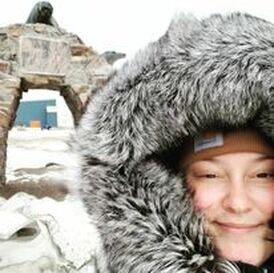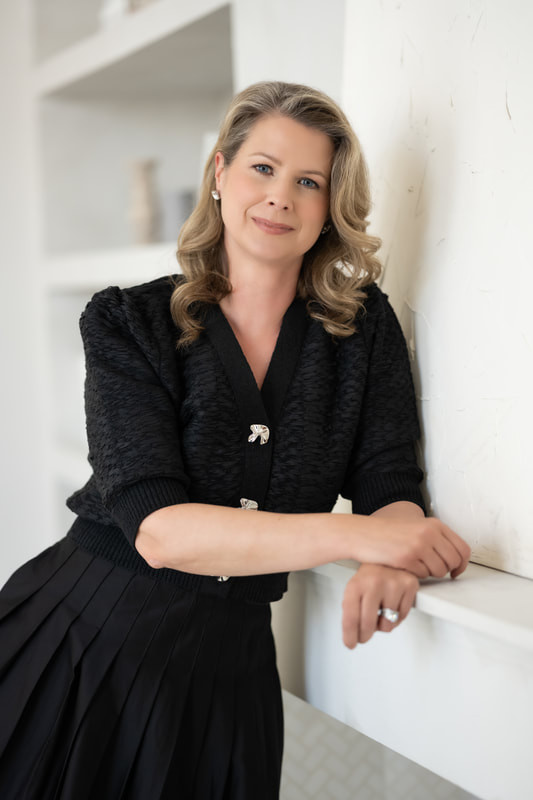 I am so happy to start the New Year with another wonderful profile in the Women Leading in Law series. Meet Victoria Perrie a criminal lawyer with Legal Aid Nunavut. The photo is of Victoria straddling the latitudinal line representing the Arctic Circle, at below -50 temperature, in Naujaat, Nunavut, while there for circuit court! 1. Tell me a little about your practice or business. I am a criminal lawyer with Legal Aid Nunavut. I work in Kangiqłiniq, or Rankin Inlet. We are a small office with three criminal lawyers, two family lawyers, and three court workers. Legal Aid Nunavut has a decentralized approach to service delivery, with offices and organizational leaders spread across the territory in Iqaluit, Kangigłiniq, Iqaluktuuttiaq, and Uqsuqtuuk. What is really special about working in Nunavut the opportunity to travel and constantly meet new people. The office I work at is the regional office for the entire Kivalliq region. Lawyers from my office represent clients in each of the seven communities in the Kivalliq. I travel at least once every three weeks for work – and I love it! There are four official languages of Nunavut. I regularly deliver legal services through an interpreter, and appear in court for hearings which will have consecutive interpretation. Cross-examination with interpretation is a skill you will learn, if you’re working in Nunavut! Learning to speak clearly and concisely is a must to ensure you are communicating with your client and interpreter effectively. Working on Inuit territory has given me the chance to explore the land, learn from elders and develop my litigation skills. From watching the northern lights dance in the sky, making long treks across the sea ice in the back of a qamutik, eating whale, seal, and polar bear, learning to prepare and harvest a caribou, to arguing in circuit courts, the Nunavut Court of Justice, and supporting public legal education – Nunavut really has a lot to offer for personal and professional development. 2. Why did you go to law school? I went to law school to learn colonial law and gain skills to be a better advocate. Throughout my pre-law life, I worked in a number of advocate service positions. I have worked for folks with diverse abilities, with many people living with FASD and ARND, those engaged in sex work, and kids in care. I wanted to learn to better use my voice to support the populations I had worked with, and to help others access justice. I thought a law degree would help me understand how to navigate systems and hone my advocacy skills. Becoming a lawyer taught me just that. Law school also taught me humility, courage, respect, and how to deal with the rollercoaster of stress and anxiety that comes with existing in a colonial institution. 3. How did you get to where you are today? Design? Chance? Both? I wouldn’t say I got to where I am today by chance or design, but rather by standing on the shoulders of giants who have come before me. Every ‘career’ decision has been made by following my heart. I have only worked on projects or took employment from places doing work that I believed in. If a firm or organization or project or person leading the work didn’t reflect my personal values or didn’t have a purpose I truly believed in, I wouldn’t engage and moved along. What has got me this far is going with my gut, not giving up, doing things I’m truly passionate about, being brave enough to fail, always trying new things, and sticking to my morals. 4. What is your most significant achievement? What are you proud of? I spent a lot of time thinking about this question and trying to decide what I would call my most significant achievement. The answer I’ve come up with is that it hasn’t happened yet. There are many things in my life that I am proud of: passing the bar, publishing papers, starting a theater school for Indigenous youth, speaking at conferences, working internationally, helping clients navigate colonial systems, my family and friends, but none of these individual experiences of pride can be chalked up as greater than another. For me, once a goal has been accomplished, I move on to the next, constantly changing my focus. Stay tuned for my most significant achievement. I can’t wait to find out what it is. My most recent experience of pride, was developing and teaching a for-credit law school course in Rankin Inlet. Working with several community partners, I was able to launch my Indigenous developed and delivered program as a for-credit high school course. This course discussed colonial law, Inuit law, and the differences and similarities between the two. Students learned from elders, community justice workers, and practicing lawyers. This class intended to culminate into a final moot presentation at the Nunavut Court of Justice to a room of Inuit justice participants. Unfortunately covid arrived in Nunavut in November 2020, putting an end to in-class instruction and school travel plans. I am now working to revamp this program and make it even better for delivery in fall 2021. 5. What are some key challenges, and more importantly, opportunities for women in law? White heteronormative patriarchy in colonial Canada is this huge umbrella of oppressive sludge which we all wade through to do our jobs. The “old boys club” of law still very much exists, even though some women are now allowed to sit at the table. Rules of ‘good character’ are set for members of the bar, making it difficult for some to access a legal career. For me, the most challenging notion is that I actively uphold and enforce the colonizers imposed laws, on land where laws have and continue to exist since time immemorial, by virtue of being a criminal lawyer. I think, within this challenge, lies opportunity. Opportunities to address situations of injustice in the court room, at the office, or on a conference call. The opportunity to be actively anti-racist and attempt to provide a trauma free experience for a client. The opportunity to be part of the change and working towards legal revolution where Indigenous opinions and legal frameworks are considered in all situations, by lawyers and judges, in policing, and by justices at all court levels. Each day is an opportunity to advance the concept that the Indigenous laws which exist on these lands need to be adhered to. 6. What advice would you give a woman starting her legal career? Trust your instincts and know yourself. I know after 3 or more years of law school, you’re probably exhausted. It is important to know what kind of person you are, or want to be. If you are uncomfortable with something, don’t do it. Don’t stay in a job or an internship or an article that kills your spirit: you WILL find something else. Don’t be afraid to speak up. Take up space and make your voice heard in the board room, the court room, and in your communities. Don’t do something because it would ‘look good’ on your resume. Do things that you love. If you haven’t already, think about your boundaries, and what they are. Don’t tolerate clients, colleagues or workplaces that cross those boundaries. Most importantly: listen to Myrna McCallum’s podcast: The Trauma-Informed Lawyer. ----------------------------------------------------------------------------------------- Thank you Victoria for taking the time to participate in this series and we all look forward to hearing about your next great achievement, I am sure it will be amazing! I started this blog series because I was tired of hearing about women leaving law and wanted to hear about women leading in law. The "Women Leading in Law" series focuses on good news stories and highlights amazing women succeeding in the legal profession. Each post includes the profiled lawyer's answers to six questions. Prepare to be inspired! ICYMI - previous posts profiled the following amazing lawyers: Amee Sandhu, Tanya Walker, Alysia Christiaen, Patricia Gamliel, Megan Cornell, Yola Ventrescu, Hilary Book, Margaret Waddell, Nandi Deterville, Jennifer Quaid, Maryann Besharat, Cynthia Mason, Roots Gadhia, Evelyn Ackah, Carrisa Tanzola, Sarah Leamon, Robin Parker, Lorin MacDonald, Karen Yamamoto, Victoria Crewe-Nelson, Lynne Vicars, Kemi Oduwole, Anne-Marie McElroy, Jennifer Gold, Jordana Goldlist, Megan Keenberg, Yadesha Satheaswaran, France Mahon, Sarah Molyneaux, Richa Sandill, Vivene Salmon, Kim Whaley, Alisia Grenville, Frances Wood, Maggie Wente, Anita Szigeti, Neha Chugh, Christy Allen & Nancy Houle, Suzie Seo, Kim Gale, Alexi Wood, Melissa McBain, Erin Best, Gillian Hnatiw, Melanie Sharman Rowand, Meg Chinelo Egbunonu, Lisa Jean Helps, Nathalie Godbout Q.C., Laurie Livingstone, Renatta Austin, Janis Criger, May Cheng, Nicole Chrolavicius, Charlene Theodore, Dyanoosh Youssefi, Shannon Salter, Bindu Cudjoe, Elliot Spears, Jessica Prince, Anu K. Sandhu, Claire Hatcher, Esi Codjoe, Kate Dewhirst, Jennifer Taylor, Rebecca Durcan, Atrisha Lewis, Vandana Sood, Kathryn Manning, Kim Hawkins, Kyla Lee, and Eva Chan.
2 Comments
1/6/2021 05:06:03 pm
Thank you for featuring Victoria. As a proud Manitoban, I’ve known Victoria for a number of years and so admire her work and the choices she has made as a human and as a professional and I agree: as excellent as her achievements have been to date, the best is yet to come!
Reply
Erin
1/11/2021 02:13:42 pm
Thank you for taking the time to comment, Senator McPhedran. While I have not met Victoria personally, I am super impressed with everything she has accomplished so far and hopefully one day we can meet in person. I am so happy she agreed to participate in my series. She has an amazing story to tell.
Reply
Your comment will be posted after it is approved.
Leave a Reply. |
Erin C. Cowling is a former freelance lawyer, entrepreneur, business and career consultant, speaker, writer and CEO and Founder of Flex Legal Network Inc., a network of freelance lawyers.
Categories
All
Archives
December 2022
|
|
(C) 2014-2024 Cowling Legal. All rights reserved.
|
Please note I am not currently practicing law.
Information on this website does not constitute legal advice and is for informational purposes only. Accessing or using this website does not create a solicitor-client relationship. See website Terms of Use/Privacy Policy. info@cowlinglegal.com
3080 Yonge Street, Suite 6060 Toronto,ON M4N 3N1 (appointment only) |






 RSS Feed
RSS Feed
